Portuguese Press
Tele semana (TV week) was a weekly TV magazine in Portugal from 1973 to 1979. At the time, there were only 2 (state controlled) TV channels, RTP1 and RTP2, both black and white.
The publisher, Ediguia, also published translations of the Italian AMZ books, which were promoted by adverts in Tele semana.
The space1999.net site Espaco 1999 has full details: 1976, 1977, 1978
Tele semana was digest-sized (like the US TV Guide), and published with a Friday date covering the TV week from the following Monday. Space: 1999 featured on 3 covers:
Issue 241 (dated 2 September 1977) had the first part of a Year 2 episode guide in a pull-out section, which was concluded in 247.
The first section contains profiles of the Year 2 actors, and the future episodes (RTP had already shown 4 episodes).

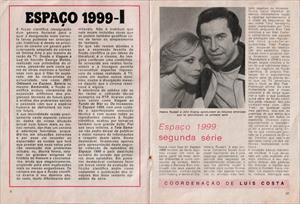
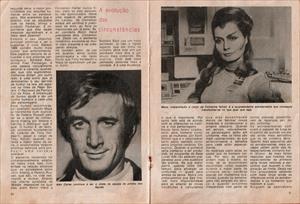
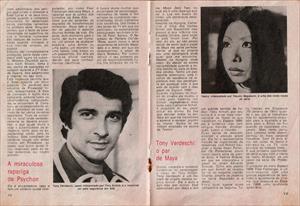
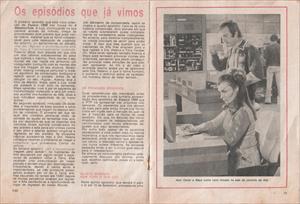
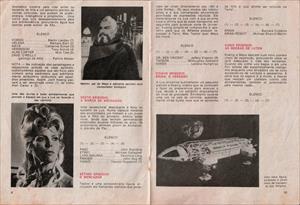
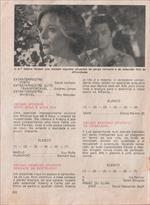
It begins with an essay on science fiction, translated here (in abridged form).
Science fiction is the name of a genre of fiction for which the most correct designation could perhaps be "historical anticipation". It has been, since the beginnings of cinema, a genre particularly adapted to the norms of film and TV. From the Journey to the Moon by the Frenchman George Meliés, made in the early days of cinema, through the wide range of smaller and fanciful works with which the vein was explored, to today's masterpieces, such as 2001 A Space Odyssey, Solaris or even Barbarella, science fiction has clearly evolved from exposition of the technical progress of the future to the analysis of the social and personal problems that the human species will face in the same future.
Its fruitfulness lies precisely in this aspect: placing our current situation in a more or less remote future, giving them a futuristic setting and props, framing them in extreme situations and thereby reminding the viewer the accounts he will have to give to his grandchildren for not resolving current problems. In other words, revisit the great enigmas of human history and materialise them, albeit allegorically, proposing more or less ingenious explanations for them. The fields in which science fiction exercises its dominance are, moreover, very difficult to delimit. It is not unusual for works to be included that can also be described as horror or simply fantasy.
There is no doubt that the favourite expression of science fiction (perhaps alongside literature) is cinema. Images give added credibility to fantasy, and special effects allows us to reconstruct impossible aspects of our reality. It took some time to attract public interest, and, just collecting examples from RTP, series such as Voyages to the Bottom of the Sea or The Invaders became famous. Space 1999, with careful and perfected technical execution and with almost all the ingredients common to science fiction, ended up also becoming a great success.
Faithful to its readers, Tele Semana could not fail to publish as much information about this series as possible. In this highlight, we will only focus on the presentation of this second series of episodes of Space 1999 and the summary description of the plot of the first twelve episodes. In a later section, we hope to give a brief account of the evolution of science fiction as well as completing the publication of the synopses of the remaining twelve episodes of the series.
The series description and profiles of the cast were taken directly from ITC publicity, including quotes from Fred Freiberger "I firmly believe that our concept is far superior to anything that any other science fiction series has been able to offer. We are not competing with "Star Trek" or any others. But we start from the premise that we have to be original in all aspects."
There is then a summary of the 4 episodes already shown on RTP, and a warning about the next 8 episodes.
Two warnings are inevitable before we proceed to a presentation of the Space 1999 episodes that RTP will present over the next eight weeks. The sources for this article were provided in English without mention of what the translation for the episode titles will be. Therefore, during the transmissions, viewers may be confronted with titles different from those presented here.
On the other hand, although the episodes follow a more or less imperative order, and which we reproduce in this pull-out, it may happen that, for various reasons, television shows them in a different order. The synopses will then become the only safe guide for the viewer. We would like to apologize to our readers for both setbacks in advance, even though we are optimistic that everything will turn out okay.
The episodes were All That Glisters until The AB Chrysalis. As warned, several episodes do not have the same title as RTP would use. The Taybor is "O Mercador" (the Merchant) but RTP would use "O Negociante" (the trader).
In issue 247, dated 14 October 1977, the remaining episodes are described. This is followed by an article about the history of science fiction (SF, in Portuguese F.C.), with an incongruous advert for sewing courses.
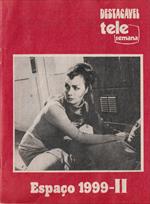
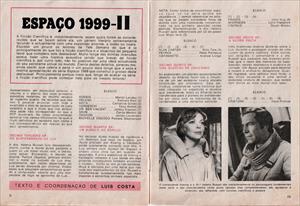
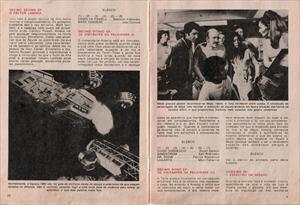
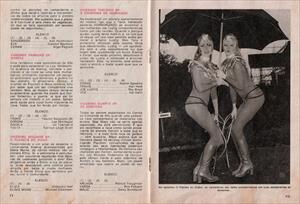
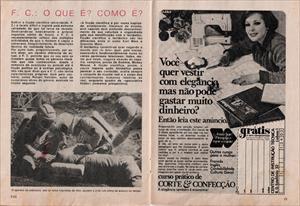
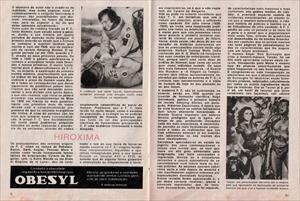
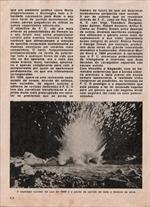
Several episodes have different titles to those used by RTP (but note there there would be several different translations in Portugal)
| Original title | RTP title (1977) | Tele Semana translation |
|---|---|---|
| Catacombs of the Moon | Catacumbas na Lua Catacombs on the Moon |
Os Subterrâneos da Lua The Underground of the Moon |
| Space Warp | Vazio Espacial Space Void |
Um Buraco no Espaço A Hole In Space |
| The Beta Cloud | A Nuvem Beta The Beta Cloud |
A Nuvem Preta The Black Cloud |
| The Bringers of Wonder | Os Emissários do Terror I The emissaries of Terror I |
Os Visitantes Da Felicidade The Visitors of Happiness |
| The Seance Spectre | Visões Perigosas Dangerous Visions |
O Espectro da Sessão The Seance Spectre |
The following editorial columns make some original points and indicate the popularity of the series in Portugal.
Criticism: 23 Years Away
By Correia Da Fonseca, Tele semana 198, November 1976, accompanied by picture of the Satazius and an Eagle (upside down!)
1999 is not just a suggestive date, one step away from the millennium milestone that the year 2000 promises to be. It is also an upcoming date. The 23 years that separate us from it are almost nothing in terms of history: 23 years ago it was 1953, nuclear weapons already existed, the confrontation between the two large national blocs was aggressive, work was already underway on Sputnik. 1999 is just around the corner, it is not the remote future.
What anxieties does the year 1999 hold over us? First of all, certainly the dramatic choice between peace and war in the world. After that, however, and also with great importance, the enormous dangers that arise from national expansion in comparison with the meagre progress in the food sector. And the itinerary of many Third World peoples on the path to independence that could lead to modern decisive changes in the global balance of forces. And the serious questions posed, within the richest countries, by the need for profound social transformations that are increasingly becoming more imperative.
These are some of the "hot spots" that remain on the horizon of anyone looking at the year, already approaching, 1999. I'm sorry if the reader found it dry for me to describe them. But it is that of the solutions that the future, if not the very survival of our children, depends on them meeting. And the quality of existence of young people who are today teenagers and will be mature people in 1999.
1999 is the theme and title of a series that is broadcast on RTP. And what does 1999 tell us about? Not of peace and war. Not the demographic explosion. Not about the upcoming and inevitable access to independence for many peoples. Not in the near future in developed countries. It tells us about interstellar space, of unknown planets, of fearful explosions in the ether. To the wise, half a word is enough. But let's say the whole word: it doesn't tell us about anything that is probable, urgent, important. It gives us a year 1999 that will have nothing to do with the year 1999 that most people will still live in.
Beyond that, it can truly be said that "1999" is a well-made, technically solid, and perhaps fascinating series. For me, all of this is not enough. But the reader will find his own criteria. After thinking for a moment. I'll wait.
Criticism: The Fake Future
By Correia Da Fonseca, Tele semana 241, September 1977
The first series of episodes of "Espašo 1999" was a huge hit with the public. Not as big as "Gabriela" or "A Visita da Cornelia", of course, but a great success. The second series, which is showing at the end of Saturday afternoons, seems to be following the same path. That's why it's important to ask some questions about you. Let's say the usual questions. Why this success? What does the series bring us? Where does it take us?
It could be said that "Space 1999" tells us about the future, and that we will always be interested in the future as a theme. Many of us find it difficult to refuse the palm of any gypsy who proposes to read our fortunes: it is a strong temptation to know what awaits us, or to have the illusion of it. Is this why "Space 1999" seduces us?
I don't think so. I don't think the majority of viewers believe in "Space 1999" as a scientific prediction. All or almost all of us have a feeling that, in just over 20 years, humanity will not have those problems, but others. Just thinking a little, we can even imagine what they will be: overpopulation, environmental degradation, the implementation of a fairer social order, "Space 1999" wants nothing to do with them. So, why the fascination that the series has on the public?
Because it tells stories, of course.
If everything on television has to be strictly useful and constructive, it can lead us to the kingdom of boring. Stories of complete make-believe, that is, entirely false, but constructed with enough wisdom to provoke "suspense", emotion, sometimes terror - which is an ingredient much appreciated by those who seek sensations. Here we can see that "Space 1999", under the pretext of a supposedly scientific vision (and, to give us the illusion of this, there are the odd toys and the technical resources of the production), is just a television drug that makes us forget, dream of a falsified future, have controlled scares and emotions that feel good. That is: here we see that "Space 1999" is a benign type of cocaine.
On this issue, everyone will have their own opinion, naturally. I, for one, can only have mine. Which is that the public has the right to fantasy, free adventures and a certain dose of levity. You cannot always live attentively, with your teeth clenched, spying on life. But also there are themes that are dangerous to play with. In relation to which it is necessary and urgent to have very fair ideas and eliminate all confusion.
For example: the future. For example: the year 1999.
Because that year our children will be men and our grandchildren will be growing up. Because we need to prepare a very serious world for them. And twenty-something years pass in an instant.
The Tele-Cats! Calm Calm!...
By António Gomes De Almeida, Tele-Semana 214, February 1977
Saturday nights have turned into nights of anguish for all the good Portuguese people. Weekend evenings are spent in an atmosphere of tension and anxiety, with people biting their nails, some fainting, others drinking tea, to try to calm their frayed nerves...
Pharmacies are attacked by excited crowds, looking for tranquillizers and soporifics, which run out quickly. The pharmaceutical laboratories don't have enough hands to manufacture the pills needed to calm the people. And why all this?
Because of the "Space 1999" programme. In this very popular series, so many tragic and strange things happen, that there is no nervous system can tolerate it without breaking completely!
Sometimes it's a Machiavellian destructive spirit who tries to liquidate Moonbase Alpha through a deadly ray. Other times, it is an interspatial expedition that finds itself surrounded by a fog even denser than that which stops the boats on the river Tagus. Still others are some of the friendly lunatics who go on a visit to an unknown planet that passes by, and find themselves struggling to get back home, because they lack super-gasoline. for the computer to work.
Calm, my people!
The Respectable Public, poor thing, at home, biting their nails and taking pills, suffers like hell, afraid that everything will blow up and Commander Koenig, Dr. Helena, and scientist Victor will die. To clarify, so do I, as a citizen in full possession of my constitutional rights.
I felt a moral duty to write here some reassuring words, addressed to all the Good and Respectable Portuguese Public and People, who suffer, on Saturday nights. In fact, the most elementary prudence and due care for the men and women of this land should have already led our Government, through the voice of the Secretary of State for Social Communication (who is beautiful and speaks well, as you know), to reassure the entire people. You never know what could happen when an entire population is in panic! Now, as the Government forgot to order explanations that seem necessary to me.
To do this, however, I have to clarify, first, how television series are made. In order not to be boring, I will limit myself to the essential aspects that have to do with the present case. Thus, after choosing the basic theme of the series, one or more writers are in charge of imagining and writing each episode.
Meanwhile, the main actors are chosen, main and secondary actors, who will earn money for their work and, normally, become public idols, if the series is really good. In addition to these main actors, other lesser-known actors are also chosen for each episode to serve as extras and play certain figures characteristic of each story. Well, what happens is that the latter are only hired for one episode or another, while the permanent actors are hired for all the episodes.
Do you already see where I'm going? Of course, you are not fools... Main actors will never die.
Even if you see, you must have already noticed, that one of them is half a millimetre from death every week, some kind of escape will appear. These are people, full of ingenuity and vitality, which will last for many years. They will last, at least, until they get tired of playing them.
As for the others, the ones we don't know from previous episodes, they will almost certainly end up in the Cemetery of Alto de São João, if at Moonbase Alpha they still use such things.
Koenig, Victor, the doctor, Paul-with-Moustache, the other skinny guy whose name I don't remember now, Kano from the computer, the little girl with the short hair, who has such a cute face, etc., these, even if the Moon splits in quarters, will survive all adventures and all misfortunes. Therefore, do not get upset when you see them in danger.
I believe I have made a valid contribution to the weekly peace and tranquillity of the good Portuguese public, which already has so much to worry about, and does not deserve more. (This sentence came out well, damn it!).
Don't forget, therefore: that, on television, it is all fiction! As, in fact, it has always been...